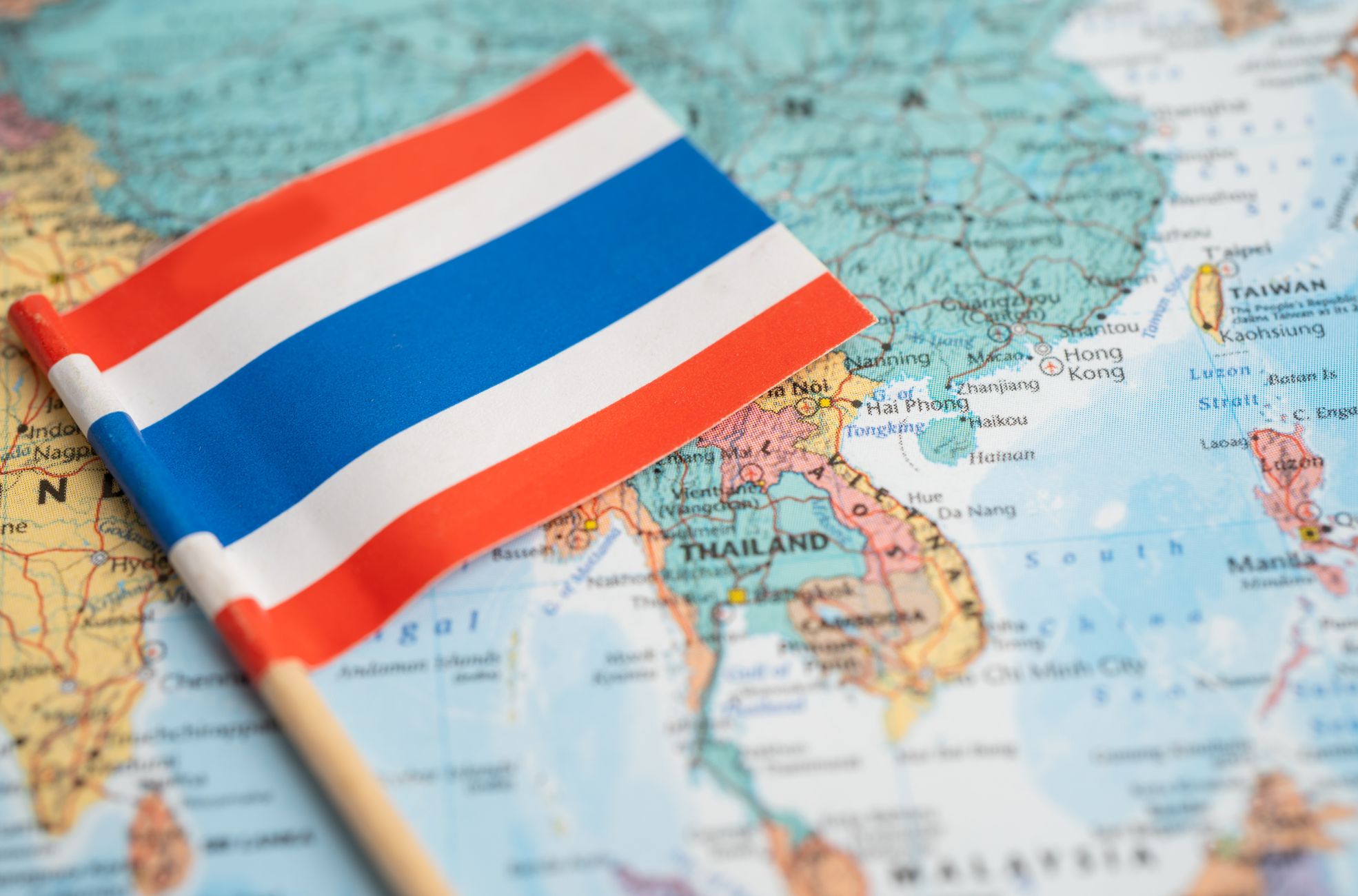Are you wondering how to start a business in Thailand? It requires a comprehensive understanding of the nation’s vibrant economic scene, legal frameworks, and cultural intricacies. With its strategic location in Southeast Asia, Thailand presents a fertile ground for entrepreneurs looking to tap into a market full of growth and innovation. As the economy shows promising signs of recovery and expansion, particularly in sectors like tourism and e-commerce, the allure of setting up a business in Thailand is undeniable.
Yet, navigating the complex landscape of starting and running a business in a foreign country can be daunting. From registering your company and understanding the tax implications to building a local presence and crafting a marketing strategy that resonates with Thai consumers, we offer a roadmap to steer your entrepreneurial journey in the Land of Smiles.
The Thai Business Market
Business Opportunities in Thailand
Thailand’s business landscape is teeming with opportunities, particularly as the economy bounces back.
The revival of the tourism sector, coupled with strong domestic consumption, has paved the way for an encouraging 3.6% economic growth in 2023, which is expected to climb to 3.8% in 2024.
The projected arrival of 25-30 million international tourists is set to pump a substantial $43.5 billion into the economy, highlighting the lucrative potential of the tourism industry.
The medical tourism sector in Thailand is also a significant opportunity, ranking 5th globally. Medical costs in Thai hospitals are much lower than those in Western countries. With a high number of JCI accreditation-certified hospitals, Thailand is an attractive destination for medical services.
Government-backed mega-projects are ready to boost the economy further. These initiatives will improve infrastructure through public investment and public-private partnerships, covering sectors like transportation and logistics, and aim to create a more connected and efficient economic environment.
Cultural Considerations and Consumer Behaviour
Getting to know Thailand’s cultural nuances and consumer behaviour is key for businesses aiming to make their mark in the market. Relationships are at the heart of Thai business culture, with initial meetings often centred on building rapport rather than diving straight into business.
The concept of ‘face’ is also important, affecting interactions and the maintenance of reputation.
When it comes to consumer behaviour, Thais are swayed by cultural factors such as respect for authority and collectivism. Superstitions and symbolism can sway purchasing decisions. Consumer demographics differ across age groups, urban and rural settings, and socioeconomic status.
These elements, along with factors like brand loyalty, quality, and social influence, shape Thai consumers’ preferences and demands.
Thailand’s Economic Landscape for Foreign Investment
Thailand’s economic landscape is becoming more open to foreign investors. The Royal Thai Government is rolling out investor-friendly schemes and policies, and the Board of Investment of Thailand has played a crucial role in drawing in significant foreign direct investment.
Around USD 700 billion have poured in, with over 100 Greenfield Investment Projects underway. Major multinational corporations are planning to set up shop in Thailand, signalling confidence in the country’s economic future.
Key Industries and Growth Sectors
Several industries in Thailand offer business growth potential. The ICT market has seen growth thanks to widespread technology adoption. Increased smartphone and internet usage and a thriving e-commerce sector have fueled this expansion.
The National Energy Plan (NEP) will transform the energy system, aiming to boost renewable energy capacity to over 50% by the 2040s. This is in line with ambitions for carbon neutrality and net-zero greenhouse gas emissions.
The food and beverage industry is a major player in the economy, with aspirations to become a top global exporter of processed foods. Key exports include rice, canned tuna, and sugar, to name a few.
The defence market, spurred by the Thai military’s modernisation efforts, has experienced a steady rise in imports, especially from the United States.
Looking forward, industries such as real estate, herbal products, electrical and electronic installations, and e-commerce are thriving. Meanwhile, the food industry, travel and tourism, gems and jewellery, automobile and machinery, and healthcare are poised for growth.

Legal Requirements for Starting a Business
Choosing the Right Business Entity
In Thailand, selecting the appropriate business structure is a crucial first step for any entrepreneur. Common business entities include partnerships, limited companies, and joint ventures. Partnerships in Thailand are categorised into unregistered ordinary partnerships, where partners share unlimited liability, and registered ordinary partnerships, which become separate legal entities upon registration.
There are also limited partnerships that limit the liability of partners to their capital contribution and require registration. If you’re considering a corporate structure, there are private limited companies, similar to Western corporations. Public limited companies can offer shares to the public and may be listed on the Thailand Stock Exchange.
Private limited companies require a Memorandum of Association and Articles of Association, with shareholders’ liability limited to the unpaid amount of their shares. A minimum of seven shareholders is needed. While foreign ownership can be 100% in some cases, certain sectors limit foreign participation to 49%.
The board of directors manages the company, and a registration fee is applicable based on the company’s capital. On the other hand, public limited companies need at least 15 promoters for registration. They also need a board of directors with a majority of Thai nationals.
Shares must be fully paid, with a set minimum face value. The registration fee for public limited companies is lower than that for private limited companies. Joint ventures are informal agreements between parties to conduct business together and, while not recognised as legal entities, are subject to corporate taxation.
Other business forms include branches of foreign companies, regional offices, and representative offices. Each has specific regulations under the Civil and Commercial Code of Thailand.
Navigating the Foreign Business Act
The FBA in Thailand governs the activities in which foreign nationals may engage. It’s important for foreign entrepreneurs to understand the FBA as it outlines the business areas where foreign participation is restricted. To operate in certain industries, foreign entities may need to obtain a Foreign Business Licence or a Certificate of Business Operation.
Consulting with legal experts or the Department of Foreign Trade can help you effectively navigate the FBA.
Registration and Licensing Procedures
Registering a business in Thailand involves several steps, including registering the company’s constitutive documents and obtaining the necessary licences for operation. The specific licensing requirements vary depending on the business’s nature.
For instance, import and export businesses or those selling food and alcoholic beverages have different requirements. It’s important to meet these requirements to ensure compliance with Thai law.
Immigration and Work Permits for Expats
Foreign nationals looking to start a business in Thailand must also consider immigration and work permit regulations. To legally work in the country, foreigners must secure a non-immigrant visa before arrival and then apply for a work permit from the Ministry of Labor.
The work permit application process typically takes about seven business days and requires various documents from both the employee and employer. The work permit is a legal document that specifies the foreigner’s job description and the associated Thai company.
Foreigners must always carry their work permits, especially at the workplace. They’re only authorised to perform the job stated in the permit for the specified employer. For business and investment activities, foreigners must obtain a Non-Immigrant Visa.
Visas such as the business visa Category “B”, business-approved visa Category “B-A”, or investment and business visa Category “IB” are available. These visas come with different validity periods and fees. Holders must obtain a work permit before starting any work in Thailand.

Financial Considerations
The Tax System in Thailand
Understanding the tax obligations is crucial for businesses. Companies registered in Thailand are liable for tax on their global income.
The CIT rate is 20%.
Foreign entities are taxed only on the income generated from their activities within Thailand. Income earned by these companies from Thai sources without a business presence in the country is subject to a Withholding Tax Thailand (WHT).
The standard rate for WHT is 15%, but dividends are taxed at 10%. DTTs may modify these rates.
Smaller enterprises with paid-in capital not exceeding USD 135,272 (5 million baht) and annual sales below USD 811,633 (30 million baht) are eligible for a tiered tax rate.
This begins at 0% for income up to USD 8,117 (300,000 baht), increases to 15% for income between 300,001 to USD 81,182 (3 million baht), and then aligns with the standard 20% rate for income above USD 81,182 (3 million baht).
International oil companies are governed by a distinct set of tax regulations under PITA, which imposes a 50% tax rate on concessionaires’ annual net profit from petroleum operations and a 20% rate on production-sharing producers.
These entities are exempt from other taxes and duties on their income from petroleum operations, provided they comply with PITA.
VAT is levied on most goods and services, with the current rate at 7%, a temporary reduction to stimulate economic recovery, with the standard rate being 10%.
Certain services, such as education, healthcare, and agriculture, are not subject to VAT.
Opening a Bank Account and Managing Finances
Establishing a corporate bank account is essential. Foreigners and non-residents must be physically present to open an account, and a foreign director must present a work permit.
The required documentation includes:
- The company’s registration certificate.
- Board meeting minutes.
- Tax ID card.
- Identification of board members and significant shareholders.
- The articles of association.
If all documents are in order, the process is usually completed within a week.
Selecting a suitable bank is crucial, with options including both local and international institutions. The four major local banks have varying requirements and minimum deposit amounts, so choosing one that aligns with your business’s needs is important.
Accessing Funding and Investment in Thailand
Entrepreneurs should explore different funding sources, such as bank loans, venture capital, angel investors, or government grants, tailored to the nature and scale of their business.
Currency Regulations and Repatriation of Profits
Thailand enforces regulations on the repatriation of earnings. Profits remitted to entities or individuals outside of Thailand are subject to WHT, which must be remitted to the Revenue Department.
The rates are 10% for dividends, 15% for interest and royalties, and 10% for branch remittance tax.
The Ministry of Finance monitors exchange control regulations to oversee the flow of foreign exchange. Significant financial transactions, particularly those involving foreign investment or repatriation of funds, require approval from authorised commercial banks.

Building Your Business Infrastructure
Finding a Suitable Location and Premises
Securing the right location is a pivotal decision for new ventures in Thailand. Options span from bustling urban centres to areas frequented by tourists. The nature of your operation will dictate the type of premises required, and costs will fluctuate based on size, position, and facilities provided. A presence in a busy locale or a renowned business district is advantageous for ventures reliant on footfall, such as retail or dining establishments.
Accessibility for patrons and vendors is another consideration, as is proximity to complementary enterprises.
Sourcing Local Suppliers and Distributors
Establishing a reliable supply chain is essential. The nation’s advantageous geographic position in the region and robust infrastructure contribute to a dynamic logistics sector. The EEC initiative is particularly noteworthy, offering numerous opportunities to forge connections with local suppliers and distributors, which is vital for penetrating the Thai market.
Hiring and Training Staff in Thailand
Recruiting and developing a competent team is crucial. Familiarity with employment regulations and cultural practices is necessary when assembling a workforce. The Thailand 4.0 policy, with its focus on innovation and technology, is cultivating talent suited for emerging sectors such as smart electronics and digital.
Tailored training initiatives ensure personnel are equipped to manage your business processes. Utilising the digital progress spurred by Thailand 4.0 can provide a competitive advantage, particularly in industries identified as growth areas like biotech and digital.
Establishing Supply Chains and Logistics
A robust logistics framework is vital for businesses involved in the movement of goods. The logistics sector, recovering from global challenges, is supported by Thailand’s strategic position and its proximity to major markets. Road freight is predominant in domestic transport, and the country’s performance in international logistics rankings reflects a conducive setting for establishing effective supply chains. Government investments, such as the high-speed rail initiative, are set to enhance domestic and regional connectivity.
The expansion of the logistics sector is evidenced by the increasing presence of Thai logistics firms and the demand for integrated transport and logistics services. The development of warehousing capabilities, particularly within the EEC and other designated zones, supports businesses requiring storage and distribution solutions.

Marketing and Networking
Developing a Marketing Strategy for a Thai Audience
To effectively engage a Thai audience, it’s essential to consider the local emphasis on relationships and trust. Price, quality, and service are the main selling points. Foreign companies, including those from the US, should consider collaborating with local agents or distributors to navigate the market successfully.
Providing in-depth training for the local marketing and technical support teams can facilitate smoother market entry and expansion.
Leveraging Online Platforms and Social Media
The digital realm in Thailand is flourishing, with a significant portion of media investments directed towards online platforms.
In 2023, out of a total media expenditure of USD 2.59 billion, approximately USD 857 million was dedicated to internet advertising. This reflects the high engagement of Thais with digital media, with nearly 70 million people online and mobile penetration exceeding the total population.
Social media platforms are widely used, with user rates of 98%, 96%, and 96% for Facebook, YouTube, and LINE, respectively. The expected increase in social media users to 62 million by 2025 underscores the importance of these platforms for marketing campaigns.
Given the popularity of online video consumption, TV streaming, and gaming, multimedia content could be a crucial component of a successful online marketing strategy.
Building a Brand in Thailand
Understanding local consumer behaviour is crucial to establishing a brand in Thailand. Thai consumers respond well to trade promotions that offer tangible benefits. These promotions are frequently conducted in supermarkets and shopping malls, which are central to consumer engagement.
The Department of Trade Promotion assists with brand awareness through industry exhibitions that combine physical and virtual elements.
While promotion strategies for industrial products may vary, trade exhibitions and social media advertising are still effective. Industry-specific exhibitions are beneficial as they provide exposure to a relevant audience. Localising marketing materials, such as product literature and technical specifications, is essential to resonate with the Thai audience.
Networking and Establishing Business Relationships
Networking and fostering business relationships are essential for success in the Thai market. Personal connections are especially crucial in interactions with government entities. Foreign companies should consider providing specialised training for their local agents, potentially at the company’s headquarters or manufacturing sites.
This investment equips the local team with essential skills and demonstrates a commitment to the partnership and the Thai market, setting the stage for sustained success.
Embarking on Your Thai Business Venture
Stepping into Thailand’s vibrant market requires a blend of strategic planning, cultural understanding, and adherence to legal protocols. With burgeoning industries and a welcoming economy, the potential for business success is tangible.
Forge ahead with a keen eye on the dynamic consumer preferences, leverage government incentives, and navigate the rich tapestry of Thai business etiquette. Remember, in Thailand, meaningful relationships often pave the way for commercial triumphs.
With your business acumen and our comprehensive guide, you are now equipped to chart a course through the Land of Smiles. We wish you prosperity and success in your entrepreneurial journey in Thailand. Let the spirit of innovation and collaboration be your guide as you turn your business aspirations into reality.
FAQs
Can a Foreigner Start a Business in Thailand?
Yes, a foreigner can start a business in Thailand. However, there are specific regulations to follow.
Foreigners must generally comply with the Foreign Business Act (FBA), which restricts certain business activities unless obtaining a foreign business license. In sectors not restricted by the FBA, foreigners can hold up to 49% of the shares in a Thai company, with 51% being held by Thai nationals. Alternatively, setting up a Board of Investment (BOI) approved company allows foreigners to own a majority or all of the shares and also offers several tax and non-tax incentives.
How Much Does it Cost to Open a Business in Thailand?
The cost of opening a business in Thailand varies widely depending on the type and scale of the business.
Generally, the minimum capital requirement for foreigners is USD 54,131 ( 2 million baht) for most businesses under the Foreign Business Act. Additional costs include registration fees, legal fees, and potential consultant fees. Setting up in a free trade zone or under BOI can alter costs significantly, with varying incentives and capital requirements.
Which Business is Most Profitable in Thailand?
The most profitable businesses in Thailand often involve tourism, real estate, export-oriented industries, agriculture, and food processing. Thailand’s robust tourism sector offers opportunities in hospitality and entertainment. Real estate development is lucrative in growing urban and tourist-heavy areas. Additionally, Thailand’s strategic location makes export-related businesses in agriculture products (like rubber and rice) and electronics very profitable. However, profitability can depend heavily on market conditions, regulatory changes, and economic stability.
How Can I Start a Small Business in Thailand?
To start a small business in Thailand, you’ll need to follow these steps: identify a business opportunity that isn’t heavily restricted for foreigners, develop a business plan, and consider forming a Thai limited company with at least 51% Thai ownership unless you qualify for BOI privileges. Next, register your business with the Department of Business Development and comply with all relevant local and national regulations, including obtaining necessary licences and permits. It’s also advisable to have local legal and financial advisors to navigate the complex regulatory environment effectively.









